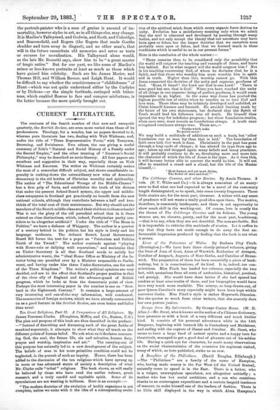CURRENT LITERATURE.
The contents of the fourth number of that new and energetic quarterly, the Scottish Review, are even more varied than those of its predecessors. Theology, for a wonder, has no papers devoted to it, whereas pure literature has two, dealing with Walt Whitman, and, under the title of " Three Representative Poets," with Tennyson, Browning, and Swinburne. Two others, the one giving a useful summary of Zola's " Natural and Social History of a Family under the Second Empire," and the other treating of "Emerson's Social Philosophy," may be described as socio-literary. All four papers are excellent and suggestive in their way, especially those on Walt Whitman and Emerson. The writer on Whitman certainly makes the most of a somewhat difficult subject, and shows considerable in- genuity in corking-down the extraordinary new wine of American democracy in the old bottles of Christian morality and spirituality. The author of "The Educational Wrongs of the Middle-Classes" has a firm grip of facts, and establishes the truth of his dictum that under the present School-Board system, the upper and middle- class ratepayers in Scotland get practically no benefit from the new national schools, although they contribute between a half and two- thirds of the total cost of their maintenance. But why should not the members of the Scotch middle-class send their children to these schools ? Was it not the glory of the old parochial school that in it there existed no class distinctions, which, indeed, Presbyterian parity con- siders to be altogether artificial ? Under the title of " The Mean in Politics," we have a defence of Whiggery. The author is a quarter of a century behind in his politics, but his style is lively and his language moderate. The defunct Scotch Local Government Board Bill forms the text for a paper on "Patriotism and Politics North of the Tweed." The author contends against "playing with Home-rule or dallying with separatism," and maintains that an Under-Secretary is all that Scotland needs to satisfy her administrative wants, the "ideal Home Office or Ministry of the In- terior being one presided over by a Minister responsible to Parlia- ment, and having under him three Under-Secretaries, one for each of the Three Kingdoms." The writer's political opinions are very decided, and are to the effect that Scotland's proper position is that of the close ally of England and the advance-guard of British progress, which he looks at from the democratic point of view. Perhaps the most interesting paper in the number is one on " Scot. land in the Eighteenth Century." It contains a large amount of very interesting and oat-of-the-way information, well condensed. The summaries of foreign reviews, which we have already commented on as a good feature in the Scottish Review, are even better and fuller than usual.


































 Previous page
Previous page